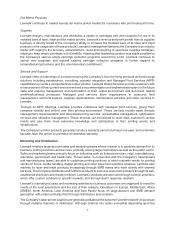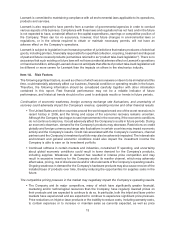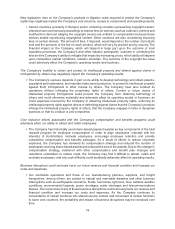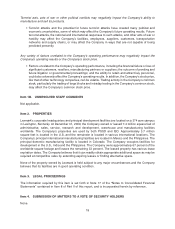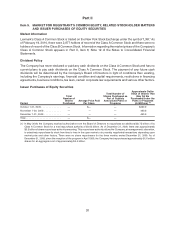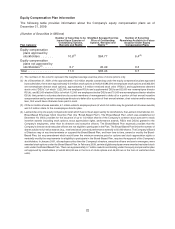Lexmark 2009 Annual Report Download - page 22
Download and view the complete annual report
Please find page 22 of the 2009 Lexmark annual report below. You can navigate through the pages in the report by either clicking on the pages listed below, or by using the keyword search tool below to find specific information within the annual report.Decreased consumption of supplies could negatively impact the Company’s operating results.
• The Company’s future operating results may be adversely affected if the consumption of its supplies
by end users of its products is lower than expected or declines, if there are declines in pricing,
unfavorable mix and/or increased costs.
Changes in the Company’s tax provisions or tax liabilities could negatively impact the Company’s
profitability.
• The Company’s effective tax rate could be adversely affected by changes in the mix of earnings in
countries with differing statutory tax rates. In addition, the amount of income tax the Company pays
is subject to ongoing audits in various jurisdictions. A material assessment by a taxing authority or a
decision to repatriate foreign cash could adversely affect the Company’s profitability.
Due to the international nature of our business, changes in a country’s or region’s political or economic
conditions or other factors could negatively impact the Company’s revenue, financial condition or operating
results.
• Revenue derived from international sales make up more than half of the Company’s revenue.
Accordingly, the Company’s future results could be adversely affected by a variety of factors,
including changes in a specific country’s or region’s political or economic conditions, foreign
currency exchange rate fluctuations, trade protection measures and unexpected changes in
regulatory requirements. In addition, changes in tax laws and the ability to repatriate cash
accumulated outside the U.S. in a tax efficient manner may adversely affect the Company’s
financial results, investment flexibility and operations. Moreover, margins on international sales
tend to be lower than those on domestic sales, and the Company believes that international
operations in emerging geographic markets will be less profitable than operations in the U.S. and
European markets, in part, because of the higher investment levels for marketing, selling and
distribution required to enter these markets.
• In many foreign countries, particularly those with developing economies, it is common for local
business practices to be prohibited by laws and regulations applicable to the Company, such as
employment laws, fair trade laws or the Foreign Corrupt Practices Act. Although the Company
implements policies and procedures designed to ensure compliance with these laws, our
employees, contractors and agents, as well as those business partners to which we outsource
certain of our business operations, may take actions in violation of our policies. Any such violation,
even if prohibited by our policies, could have a material adverse effect on our business and our
reputation. Because of the challenges in managing a geographically dispersed workforce, there
also may be additional opportunities for employees to commit fraud or personally engage in
practices which violate the policies and procedures of the Company.
The failure of the Company’s information technology systems, or its failure to successfully implement new
information technology systems, may negatively impact the Company’s operating results.
• The Company depends on its information technology systems for the development, manufacture,
distribution, marketing, sales and support of its products and services. Any failure in such systems,
or the systems of a partner or supplier, may adversely affect the Company’s operating results. The
Company also may not be successful in implementing new systems or transitioning data, including a
current project to implement a new enterprise-wide system. Because vast quantities of the
Company’s products flow through only a few distribution centers to provide product to various
geographic regions, the failure of information technology systems or any other disruption affecting
those product distribution centers could have a material adverse impact on the Company’s ability to
deliver product and on the Company’s financial results.
16



